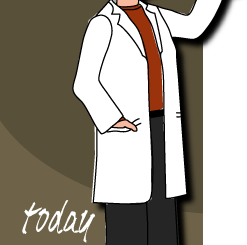So here's a little something that I find myself thinking about from time to time. Now, bear in mind, this isn't something I ever really looked into too deeply--what you read here is really as far as I've gone with it. But I thought maybe somebody out there might have some interesting insight or could at least point me in the direction of someone else who does.
So here goes: Given what we know about neurosciece, specifically neurochemistry--which isn't much--how is it possible that we could have free will? Every single thing we do, hear, see, smell, and think can be reduced to chemistry. For instance, when I move my finger, it's nothing more than the result of muscle fibers contracting which were triggered to do so by their attached nerve cells. The nerve cell releases a neurotransmitter which is absorbed my a nearby muscle cell. That then triggers a cascade of protein-protein interactions, etc, and the muscle fiber contracts. It's all just cause and effect. And the same can be said for a thought. My understanding is that a thought, at least at the molecular level, is just a series of nerve impulses. Once nerve cell releases a neurotransmitter which is detected/absorbed by a neighboring nerve cell. This causes yet another release of neurotransmitter and the cascade of cause and effect goes on and on. If this is indeed the case, how could I (whatever "I" means) have any control over my thoughts, actions, etc. if it all can be reduced to chemicals and casue and effect? How could "I" have any control of the movement of chemicals, etc in my brain, or anywhere else in my body for that matter?
Having said that, I can't help but believe I do have free will, if for no other reason than the alternative is too unbearable. I just don't understand how it's possible given what science has taught us. Maybe what I'm really asking is: what is a thought? or how does a thought arise?




- dooce
- kottke
- cool hunting
- the sneeze
- evan jones
- emdot
- defective yeti
- fourdeadfish
- lileks
- collision detection
- word has it
- defense tech
- stan's blog
- 3 quarks daily
- volokh conspiracy


- andrew sullivan
- city journal
- cato institute
- heritage foundation
- rockridge institute
- fire
- aei
- factcheck
- congress
- supreme court


- playbill
- photographic
- popular photography
- file magazine
- css zen garden
- phaidon
- 34 west
- broadway
- qoop
- dpchallenge


- go psu sports
- the new yorker
- teaching company
- american rhetoric
- amazon
- slo town
- gladwell
- bryson
- singh
- ishmael
- macarthur foundation
- nobel prize
- wordspy





1 comments
Man Ray, the dada/surrealist, contemplating the suicides among artists he had known came to the following conclusion: Where there is no answer, there is no problem.
If you start with the driver and work your way down to the road, it’s pretty obvious that humans are a necessary part of the workings of an automobile. If, on the other hand, you start with the tires, and gather minute metallurgic and chemical data relating to the apparent structure of automobiles without prior knowledge of drivers, then to speculate on the nature of humankind from that data alone would be, at best, meaningless. In other words, you can know everything there is to know about the car itself without knowing anything about who or what drives it.
Science is a giant puzzle with amazingly practical consequences. “Poor George,” Anne says at the end of the screen version of Tinker, Taylor, Soldier, Spy, “life is such a puzzle for you.” Scientists and spymasters tend to be comfortable on the puzzle side—I fancy puzzles myself. Zen masters and Christian mystics spend their time uninvolved with them—we should learn to exist in this way also. A Zen master’s enlightenment is not a philosophical or scientific construct. A mystic’s oneness with God is not on the basis of a defined set of beliefs, creeds, or formulas. It is necessary to let go of science and puzzles in order to find the self, or God, depending on your vocabulary. Not because one exists and the other does not, but because they exist differently, and in reverse of our normal understanding.
Thoughts are physical, as neurochemistry is discovering, though we wanted them to be who knows what—extradementional, perhaps, or mind stuff. Spirit is nonphysical, and in our present mindset easily dismissed. Many thousands of years ago this was known and clearly understood. It is the basis of most creation myths. The physical mirrors the spiritual.
Behind every physical state is another physical state, but not forever. There comes a point, outside of time, but a point of sorts nonetheless, when spirit and the physical are just coming into existence. The one looks into the other and the dance begins, the game unfolds, and a nearly infinite puzzle emerges. The two coexist, one in time, one outside of time.
The question of freewill is troublesome only if we seek to find its explanation solely in the physical. This may sound odd, because predestination is a religious preoccupation, but I think the concern with it marks the beginning of the modern scientific mindset. It talks God, but thinks billiard balls. If one knows God, in the way I am here using the term, then there is no answer, because the problem does not exist.
Wednesday, December 15, 2004
Post a Comment | Back to Hey Paul.